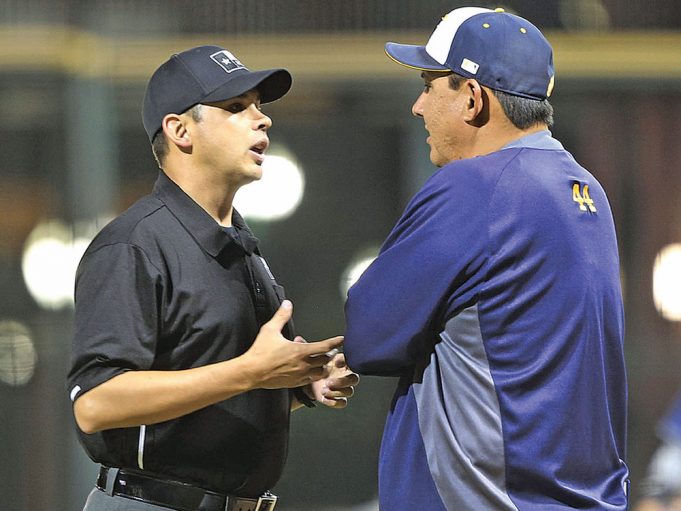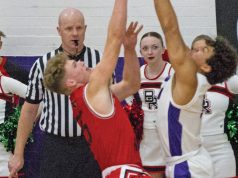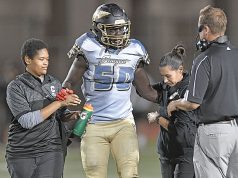To be a top official you must understand coaches, their goals, their methods and their tactics. Coaches’ personalities range from timid to terrible, from understanding to unreasonable and from polite to pugnacious.
Knowing coaches’ personalities and what type of coach they are will give you a great opportunity to manage the game efficiently. Sometimes a clear and concise explanation will resolve a situation. Other times a warning may do the trick. Occasionally an official conference is the answer. And once in a while humor may help defuse a confrontation.
Let’s examine the types of coaches you might encounter.
Dr. Jekyll-Mr. (or Ms.) Hyde
Dr. Jekylls warmly greet you in the parking lot or near the bench and exchange pleasantries, stories and jokes and assure you how happy they are to see you. Then a few minutes before the game begins, they drink the potion that turns them into a monster until the game ends. You must be prepared for the emergence of the daunting Hyde. If you suspect a Jekyll, firmly but politely extricate yourself and go about your pregame routine. The opposing coach may be watching all of that frivolity and may feel the playing field isn’t even. Then, you may have two problem coaches on your hands.
Apologizer
This type usually finds the officials after the game and apologizes for poor behavior during the game. The apology is usually not sincere. Apologizers are worried about the next game when they have the same officials. The Jekyll-Hyde coach frequently becomes an Apologizer after the game. Don’t fall for that ruse.
Praiser
The Praiser likes to tell the officials how great they are before the game to the point of absurdity, perhaps even telling the players that you are one of the best officials of all time. Of course, the Praiser is looking for the first call (and all of the following calls) to favor his or her team. When a call does go against a Praiser’s team, you’ll usually hear the backhanded compliment, “You’re better than that!”
Intimidator
The Intimidator uses physical size, voice, histrionics, reputation, previous success, perceived status in the conference or state power structure or general aggressiveness to intimidate the officials. While it’s generally unwise to try to match the Intimidator’s act, backing down or appearing meek isn’t the answer either. Work your game. If the Intimidator steps over the line, forget all the above factors and treat him or her like anyone else: penalize or eject as the situation dictates.
Divider
That type works covertly to drive a wedge between the officials. Examples of what the coach might say to one official are, “You’d never make a call like that,” or “Tell your partner that’s two blown calls.” Don’t buy what the Divider is selling.
Bookworm
The Bookworm coach is a close relative of a Rulebook Charlie official. The Bookworm is usually an intelligent coach who studies the rulebook religiously but who often misinterprets the spirit and intent of the rules. That type is often a literal-thinking person who doesn’t understand or appreciate the nuances of the rules. A common argument will be, “Well, that’s not what the rulebook says.”
Inciter
Inciters try to rile up spectators to “ride” game officials with the intent of pressuring them to make calls in their team’s favor. Any coach who attempts to incite spectators must be issued a strong warning or be ejected from the game.
Whiner
Most Whiners are also nitpickers, pointing out minor or perceived infractions, such as, “That player’s towel isn’t the same color as the rest,” or “The first baseman isn’t wearing a first baseman’s mitt.” There isn’t much you can do about the Whiner except grit your teeth and hope the Whiner gets laryngitis.
Polite Coach
The Polite Coach is often a polished critic, prefacing comments with the word, “Sir” or “Ma’am.” Usually, the words that follow will be critical, confrontational or even nasty. The Polite Coach, after being penalized or ejected, often laments, “What for? I was polite.”
Anti-Officials
Let’s face it. Some individuals and some coaches are anti-official or just anti-authority. Anti-official coaches just can’t be pleased. They can make your game difficult and trying. Their competitive nature is such that you are an obstacle in their quest to gain a victory. If you understand that type you can manage that coach more successfully. Remember not to take it personally. They’re yelling at the uniform, not the person wearing it.
Official-Coach
The coach who is also an official can be a nightmare. While the Official-Coach should realize how difficult an official’s job is, he or she is often biased, insensitive and out to prove expert knowledge of every phase of the game. Sometimes the Official-Coach goes beyond showing off and tries to show up the officials. That can never be tolerated.
Silent Coach
The Silent Coach is a brooding, scowling individual who doesn’t like or trust officials. At the pregame meeting or when you introduce yourself, Silent Coaches shuffle their feet, look at the ground and nod or shake their head rather than fully participating in the meeting. They might speak to the opposing coach but avoid any unessential conversation with the officials. Do not let the silent treatment unnerve you and vow to do your best possible job. Also, don’t be fooled. That silent act before the game could be a ploy for a torrent of rage once the action begins.
What's Your Call? Leave a Comment:
Note: This article is archival in nature. Rules, interpretations, mechanics, philosophies and other information may or may not be correct for the current year.
This article is the copyright of ©Referee Enterprises, Inc., and may not be republished in whole or in part online, in print or in any capacity without expressed written permission from Referee. The article is made available for educational use by individuals.
















